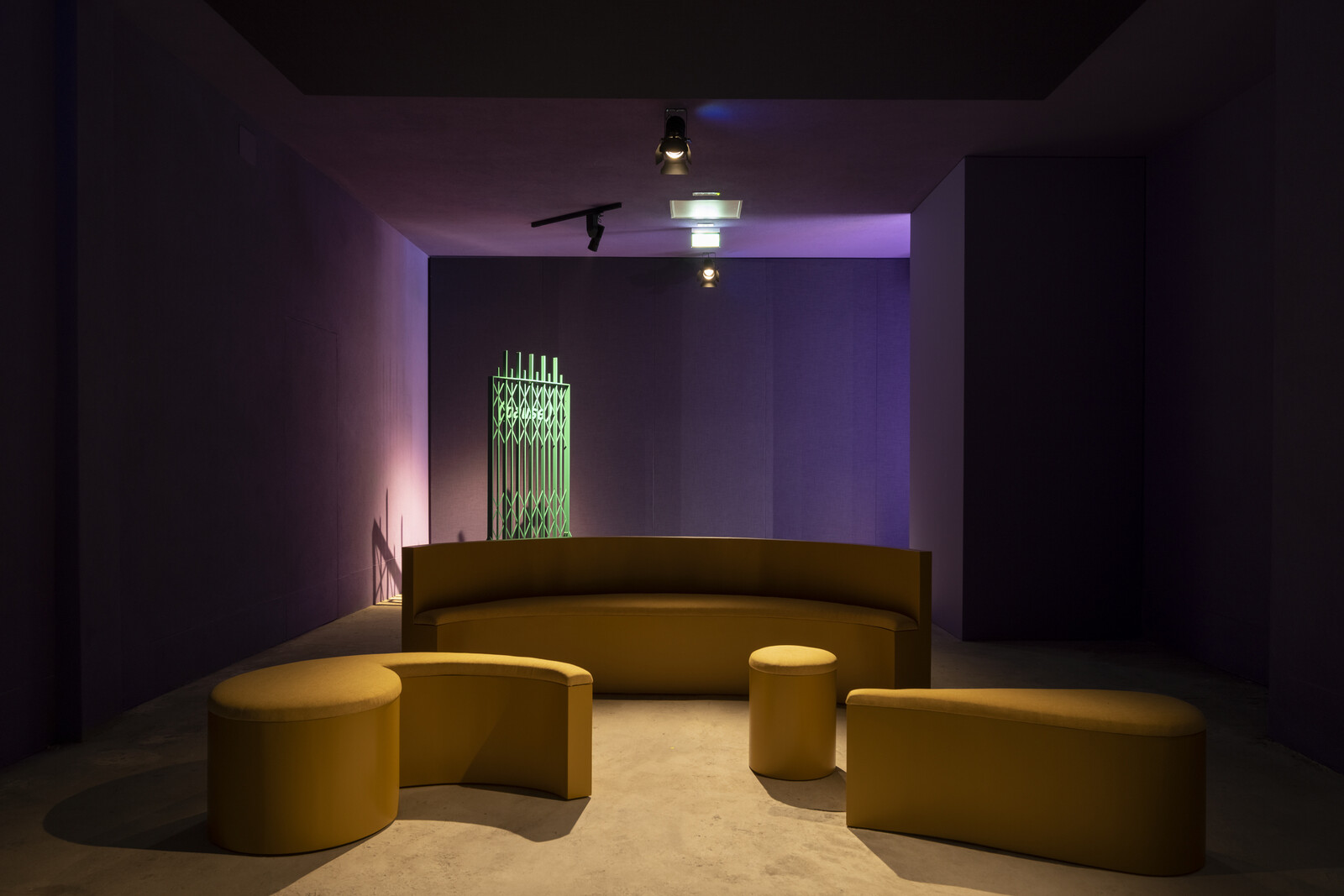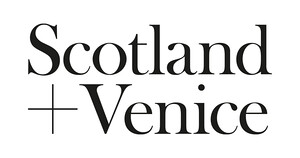deep dive (pause) uncoiling memory
April 23–November 27, 2022
Docks Cantieri Cucchini
S. Pietro di Castello, 40
30122 Venice
Italy
The Scotland and Venice partnership is delighted to present Alberta Whittle and her new body of work deep dive (pause) uncoiling memory at the 2022 Venice Biennale. At a time in history when it is not enough for the world to merely acknowledge global injustice, this remarkable exhibition invites us to unravel contested and difficult histories and creates an open space for conversation, hope, healing, and reconciliation.
Presented within the purple-washed walls of the exhibition, her work rings out as a beacon of hope to a world crying out for change. Unveiling three new pieces of work in film, sculpture, and tapestry, deep dive (pause) uncoiling memory is an opportunity for all who enter to confront the tough realities of police brutality, colonisation, gender and race politics and climate change. In presenting us with these uncomfortable truths, deep dive (pause) uncoiling memory seeks to enable restorative justice and self-healing.
Building on themes established in previous work, this new exhibition demonstrates the artist’s unmatched ability to tell difficult, and often painful, stories with empathy, vulnerability, and an abundance of love, something the artist is intentional about.
Alberta Whittle: “The luxury of amnesia is a really potent idea in my practice. For so long there was this complete reluctance and avoidance in discussing Scotland’s role within slavery and within plantation economies. There’s this sense that racism and police brutality is an English problem or an American problem, something that isn’t happening on these shores. There are ways in which the luxury of amnesia has been nurtured by governments, by the stories we tell ourselves, by ways we find to avoid our own complicity with our own privilege—and it’s interesting to think about the conversations that are still missing.
“There’s a numbness that can happen when you just see names and that endless footage of George Floyd being murdered. I wanted to find a way to think about these ideas without retraumatising myself or retraumatising the audience, and I think there are other ways to do that—and that led me to really return to love. I wanted there to be that place for love in the work because it ends at such a place of sorrow when I think about the endless list of names that are growing.
“I wanted us to really remember the names we hear in the news; we have to resist becoming numb to them. I think there needs to be a reckoning with these ideas if we are really going to make change, including re-assessing the power we give to the police—that unchecked power—and also institutional racism which is a huge part of why all of this happens.”
With much of the art world asking tough questions about what needs to be done to address its own systems of oppression, Alberta Whittle’s commission for Scotland + Venice comes at a time when cultural organisations across Scotland and the world seek to decolonise the sector.
Amanda Catto, Head of Visual Arts at Creative Scotland and Chair of the Scotland + Venice partnership said: “The Scotland and Venice partners are delighted to be presenting this major new body of work by Alberta Whittle at one of the world’s most prestigious festivals of contemporary art, La Biennale di Venezia.
“Alberta draws us into a space where contested histories and difficult truths can be understood within frameworks of love, healing and reparation. Alberta insists that we acknowledge the enduring damage and pain caused by slavery and colonialism and that we reject the toxic legacies of violence and oppression that still impact on the lives of Black people today. Creating space for reflection, remembrance and conversation she encourages us to imagine and make possible new and alternative futures.
“The Biennale is a unique environment for the sharing of contemporary art and ideas, and it’s the perfect arena for us to share Alberta’s work and to welcome people from across continents and cultures to share their experiences and perspectives. It’s been a privilege to work with Alberta, and the many brilliant collaborators, partners and supporters who have made this project possible. We give thanks to all involved and look forward to welcoming visitors from April through to November.”
This spirit of collaborative working is central to much of Whittle’s practice. Much like the chords in the textile fabrics of Entanglement is more than blood—a tapestry handwoven at Dovecot Studios in Edinburgh and hand tied by the artist to its Biennale resting place. Embellished with glass trading beads, whaling rope, and cowrie shells, the woven fabric tells a story of maritime trade, womxn of resistance, and nature as a protector of the oppressed.
Voices from the past and present also collide in Lagareh—The Last Born, a 40-minute film shot across multiple locations in Scotland, England, Italy, Sierra Leone and Barbados. Co-commissioned and produced with the support of Forma, this is a moving and affecting piece that raises important questions about the effectiveness of the prison system and draws attention to the racial injustices, violence and death experienced by Black people at the hands of the police. As with much of Whittle’s work the trauma is a gateway for audiences to pause and consider the full humanity of the peoples her work captures; their hopes, their fullness, their experiences—and in doing so she presents a dialogue of renewal and love beyond the violence that is often focused on by media.
A series of sculptural gates act as framing devices in the exhibition, holding the tapestry, the film and the viewer in the space. Fabricated in steel at Glasgow Sculpture Studios, the deep green colours of the metalwork are offset by stained glass panels in almost water-like purple and pink that nod to the colours of the glass lamps that shine across Venice. Holding formal qualities that remind us of the architecture of punishment, incarceration and human bondage the gates create moments in the space for pause, remembrance and reflection.
The exhibition is presented at the Docks Cantieri Cucchini, S. Pietro di Castello, 40, 30122 a fully accessible space located between the main sites of the Biennale, the Giardini and Arsenale.
The exhibition opens to the public from April 23, with supporting digital programming running on the Scotland + Venice website. The exhibition runs through to November 27, 2022.
Public opening times: Saturday, April 23–Sunday, November 27
The exhibition is open Tuesday to Sunday, from 10am to 6pm.
The film is 40 minutes long and will be screened at 10:10, 11:00, 11:50, 12:40, 1:30, 2:20, 3:10, 4:00 and 4:50.
For more information or for media requests please contact Studio Tuku.
Sophie Amono: sophie [at] studiotuku.com / T +44 (0) 739 444 6305



